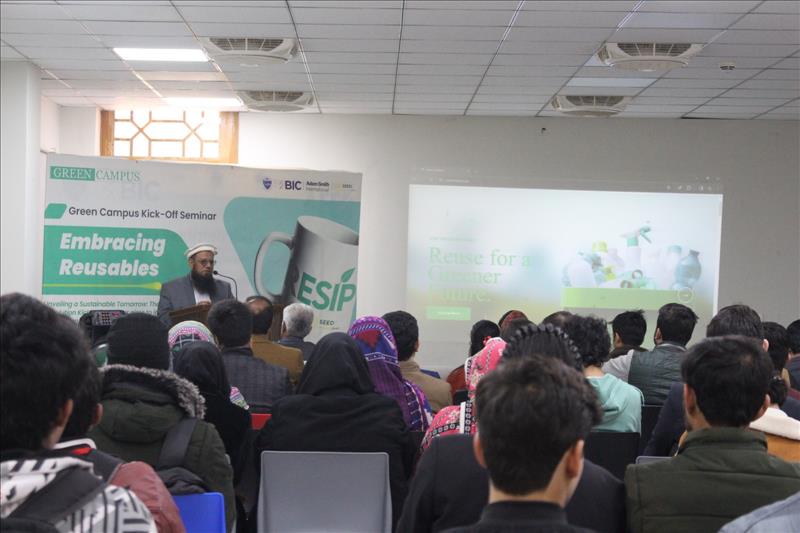
Varsity Of Peshawar's Academics Out To Ensure Plastic-Free Campus
The initiative launched in collaboration with Sustainable Energy and Economic Development (SEED) was unveiled during a seminar titled“Embracing Reusable: Unveiling a Sustainable Tomorrow.”
Spearheading this initiative are esteemed individuals in their respective fields, with renowned sociologists Dr. Zafar Khan from the Sociology Department and Dr. Shakil Ahmad from the Institute of Management Sciences (IMS), University of Peshawar.
Under the initiative, cafes within the campus will introduce reusable cups and glasses. environmental responsibility.
To support this initiative, a nominal additional charge of Rs. 20 will be applied when a student opts for a reusable cup with their beverage purchase.
Also Read: Undercover Afghan National Foiled in Attempt to Obtain False Pakistani Identity in Chitral
What sets this program apart is its innovative cup return policy. If a student purchases tea from one restaurant using a reusable cup, they have the unique opportunity to return the cup to any other café within the campus. Upon return, the student will be reimbursed the additional Rs. 20 they paid for the cup. This not only promotes the reduction of single-use plastics but also fosters a campus-wide culture of reuse and sustainability.
Among the speakers were Dr. Bushra Khan from the Environmental Science Department, Dr. Habib Jan, Director of the Environmental Protection Agency, Dr. Noman Khan from Agriculture University, Management, and Development Specialist Hashim Khan, and Taimur Khan from Sustainable Energy and Economic Development (SEED).
In a presentation, Dr. Shakil revealed that a quantitative study was conducted under the initiative by students of the Sociology Department and IMS that shows a staggering statistic: a million pieces of disposable cups are used every month in the University of Peshawar alone.
He said if other institutions within the campus are considered, such as the Agricultural University and Islamia College University, the total quantity of disposable cups used would be significantly higher.
Painting a distressing picture of escalating plastic pollution, Dr. Bushra lamented the transformation of the once serene green lawns of the university into areas littered with plastic waste. She expressed concern about micro-plastics infiltrating the food chain, warning that plastic waste is finding its way into waterways, and agricultural lands, and, ultimately, becoming part of the food chain in the form of microscopic particles.
During a panel discussion organized as part of the seminar, Dr. Noman emphasized the severe impacts of plastic pollution , revealing that studies have identified nano-particles of plastic in the food chain that persist for up to 300 years. He underscored that plastic pollution is affecting every aspect of the environment, from the food chain to surface and groundwater resources.
Dr. Hashim argued that it is not too late to make a change and create a society free of plastic waste. He emphasized the importance of rigorous behavior change campaigns, shedding light on the sociological, psychological, physical, and mental impacts of plastic pollution on humans.
Discussing legislation and policy, Dr. Habib Jan acknowledged that the government had formulated clear and stringent laws, including a ban on non-biodegradable plastic in the province. However, he pointed out weaknesses in implementation, stating that the government still lacks control over the use of plastic.
Representing SEED, Taimur stressed the need to incorporate environmental education into the curriculum from primary to university levels, highlighting the importance of fostering a sense of responsibility towards the environment from an early age.

Legal Disclaimer:
MENAFN provides the
information “as is” without warranty of any kind. We do not accept
any responsibility or liability for the accuracy, content, images,
videos, licenses, completeness, legality, or reliability of the information
contained in this article. If you have any complaints or copyright
issues related to this article, kindly contact the provider above.















Comments
No comment